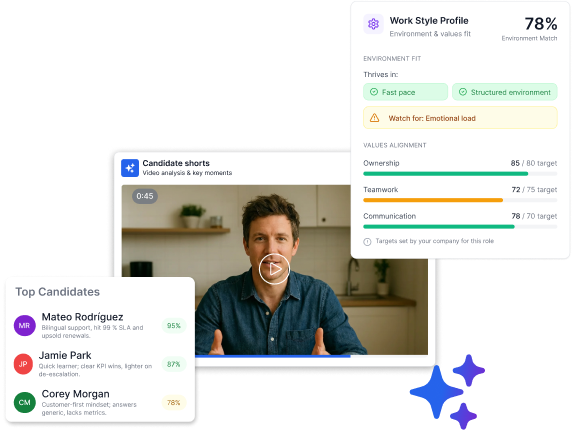Hiring software has gotten a lot smarter. But one of the simplest and most powerful tools in a recruiter’s arsenal is still the humble knockout question. These are the yes/no, dealbreaker filters embedded early in the application process to save hiring teams from reviewing clearly unqualified candidates. And with platforms like Truffle's one way video interviews, knockout questions are no longer something you need to manually create or manage; they’re automatically generated based on your job description.
Let’s break down how knockout questions work, what makes them effective, and how Truffle turns them into an automated, bias-reducing screening layer.
What are knockout questions?
Knockout questions are pre-screening filters built into a job application. They determine whether a candidate proceeds to the next stage or is instantly disqualified—without ever being reviewed by a recruiter or hiring manager.
They usually cover non-negotiable requirements such as:
- Do you have a valid work permit in the country of employment?
- Are you available to work weekends or nights?
- Do you have at least 3 years of experience in [X]?
- Do you hold a specific certification or license?
- Are you willing to travel or relocate?
Answer “wrong” (from the employer’s perspective), and the application is automatically rejected. The candidate’s resume won’t be reviewed. They won’t be contacted. It’s a hard stop.
Why knockout questions matter
Recruiters are drowning in applications—most of which are from underqualified or misaligned candidates. Knockout questions help solve for:
- Efficiency: They instantly eliminate applicants who don’t meet your must-haves, cutting the review pool by 50% or more
- Consistency: Everyone gets the same questions, asked the same way, upfront
- Compliance: Questions can be tied to genuine job requirements, helping prevent biased decision-making later
- Candidate clarity: Applicants can self-select out if they see questions that clearly indicate a mismatch
Done right, they save time for everyone involved.

How Truffle automates knockout questions
Truffle doesn’t ask you to manually set up your application filters. Instead, it reads your job description and automatically generates knockout questions tailored to your must-haves.
Here’s how it works:
- You write your job description
- Just include your non-negotiables as you normally would: required experience, certifications, work conditions, etc.
- Truffle parses the description
- Using AI, Truffle identifies phrases like “must have 2+ years of customer service experience” or “requires weekend availability.”
- It generates knockout questions automatically
- For example, “Do you have at least 2 years of customer service experience?” or “Are you available to work weekends?”
- Candidates answer during their application
- No need for you to lift a finger. If someone answers incorrectly, Truffle stops the process and tags the application accordingly.
- Scoring and summaries are instantly updated
- Truffle provides a match score that takes into account both knockout responses and more nuanced fit factors like communication and values alignment (via video responses or asynchronous interviews).
Why knockout questions matter for small teams
Small businesses don’t have time to screen hundreds of applicants manually. But they also can’t afford bad hires or risk missing out on great ones due to inconsistent filtering.
Truffle helps teams:
- Avoid wasting hours on clearly unqualified candidates
- Ensure hiring decisions align with hard requirements
- Provide a better experience for serious applicants
- Reduce risk by standardizing pre-screening questions and criteria
You’re not just filtering people out. You’re ensuring the right people get through.
What knockout questions aren’t
It’s important to distinguish knockout questions from other application questions:
- EEO questions (race, gender, veteran status) are for compliance, not decision-making
- Soft skill or personality questions may be part of later-stage assessments, but they shouldn’t be used as disqualifiers unless they tie directly to job performance
- Salary expectations might be a consideration, but should rarely be an automatic disqualifier unless tightly constrained
Truffle keeps this distinction clear as knockout questions focus strictly on job-related, must-have criteria.
Best practices when using knockout questions
Even though Truffle automates the setup, it’s worth keeping a few things in mind:
- Only knock out what’s truly non-negotiable: Don’t overuse them or set unnecessarily strict thresholds
- Keep language clear and specific: Avoid ambiguity like “Do you have relevant experience?”
- Give candidates visibility: Be upfront in the job description about key requirements
- Review flagged applicants periodically: Mistakes happen; Truffle makes it easy to review knocked-out applicants if needed
Business impact of knockout questions is automation with accountability
Knockout questions are a deceptively simple way to improve hiring outcomes. But they only work when embedded in a workflow that ensures:
- Recruiting automation doesn’t come at the cost of context
- Disqualifications are traceable and fair
- Candidates who do pass the knockout stage get a fast, smooth experience
Truffle is built for exactly that. It uses structured, role-specific criteria to eliminate noise and then delivers AI-powered summaries for the candidates who make it through.
Faster screening. Better hires. And no more resume roulette.
Want to see how Truffle automates knockout questions based on your job descriptions?
Book a quick demo and we’ll show you how to go from 100 résumés to 5 qualified interviews without lifting a finger.



